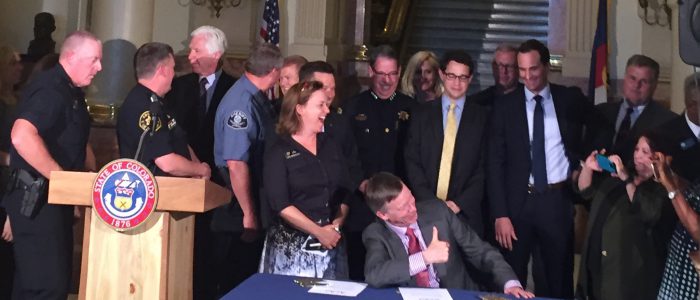
HB-1220 – Prevent Marijuana Diversion To Illegal Market
HB-1220 – Prevent Marijuana Diversion To Illegal Market

Governor Hickenlooper describing legislation that limits marijuana diversion to the illegal market prior to bill signing.
HB-1220 places limits on the number of marijuana plants that can be possessed or grown on a residential property to 12. Large residential marijuana grows and the manufacturing operations they often bring with them have many consequences, including obvious health and safety concerns, an increase of both human and automobile activity, extensive odors, and potential stigmatization of adjacent properties. All of which are inconsistent with residential neighborhoods.
Among 28 other states that have legalized marijuana for adult or medicinal use, 12 states ban home cultivation altogether, and no other state permits home grows of more than 16 plants. Large scale home grows of more than 16 plants more appropriately belong in an agricultural or commercial zone than in a residential neighborhood.
CAR worked with the Governor’s office and other stakeholders to limit the marijuana grey market and its effects on real estate.

Governor Hickenlooper signs HB-1220 and HB-1221 into law with Majority Leader, K.C. Becker, and representatives from a diverse range of stakeholders who support limiting marijuana plant counts and diversion to the illegal market including Janene Johnson who represented the Colorado Association of REALTORS®.
First, the bill maintains local control. If a local jurisdiction has a plant count ordinance, that law is the ruling authority. If there is no local law, then the new statewide plant count is limited to 12 plants in or on a residential property. However, for those local jurisdictions that do not have a local plant count limit, the statewide limit of 12 plants can be increased to 24 plants if the medical marijuana patient or caregiver registers with the state licensing authority, provides notice to that local jurisdiction, and follows any local jurisdiction disclosure and inspection requirements pertaining to their cultivation of marijuana plants.
CAR supported this legislation because large residential grows can interfere with a homeowner’s quiet enjoyment of their most sacred place: their home. Further, the current medical marijuana grow regulations do not respect the financial investment residential property owners have made in what is often their single largest investment.


